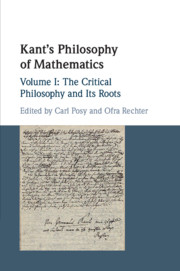Book contents
- Kant’s Philosophy of Mathematics
- Kant’s Philosophy of Mathematics
- Copyright page
- Dedication
- Contents
- Contributors
- Acknowledgements
- Introduction
- Part I Roots
- Part II Method and Logic
- 4 Kant’s Theory of Mathematics
- 5 Singular Terms and Intuitions in Kant
- 6 Kant and the Character of Mathematical Inference
- Part III Space and Geometry
- Part IV Arithmetic and Number
- References to Works by Kant
- Bibliography
- Index
6 - Kant and the Character of Mathematical Inference
from Part II - Method and Logic
Published online by Cambridge University Press: 24 April 2020
- Kant’s Philosophy of Mathematics
- Kant’s Philosophy of Mathematics
- Copyright page
- Dedication
- Contents
- Contributors
- Acknowledgements
- Introduction
- Part I Roots
- Part II Method and Logic
- 4 Kant’s Theory of Mathematics
- 5 Singular Terms and Intuitions in Kant
- 6 Kant and the Character of Mathematical Inference
- Part III Space and Geometry
- Part IV Arithmetic and Number
- References to Works by Kant
- Bibliography
- Index
Summary
Does Kant regard mathematical inference as a nonanalytic mode of inference relying essentially on pure intuition, or rather as advancing through strict conceptual analysis from synthetic premises? Commentators have found textual support for both readings, leading to incompatible accounts of the synthetic character of mathematical judgment. This paper develops a new argument establishing that Kant views mathematical inference as essentially dependent on extraconceptual resources. The paper also establishes that Kant employs “analysis” and its cognates in a number of senses in the critical period. In particular, he recognizes a notion of analysis directed to intuitions, thus distinct from conceptual analysis. This finding leads to a new reading of his famous description of mathematical inference as “proceeding in accordance with the Principle of Contradiction” (B14). Kant’s choice of the B14 formulation is explained as reflecting his desire to distance his own antilogicist theory of mathematical inference with its essential dependence on pure intuition from C. A. Crusius’s antiformalist theory of inference grounded in thinkability.
Keywords
- Type
- Chapter
- Information
- Kant's Philosophy of Mathematics , pp. 126 - 154Publisher: Cambridge University PressPrint publication year: 2020
- 1
- Cited by

